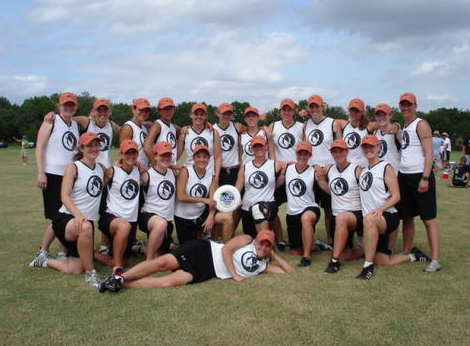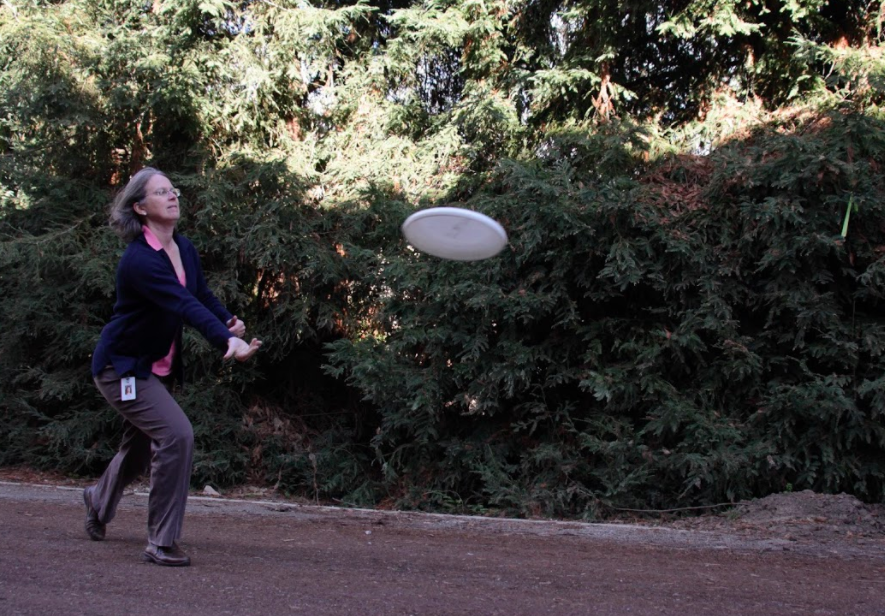Meet your teacher: Physics teacher plays in tight-knit Ultimate Frisbee community
Allersma demonstrates her frisbee skills. Allersma has played both competitively and recreationally.
March 8, 2018
 Aside from being a full-time mom and physics teacher, Dr. Miriam Allersma is also an ultimate frisbee lover. Having participated in the sport for over fifteen years, she has had many exciting experiences as player, team captain and coach.
Aside from being a full-time mom and physics teacher, Dr. Miriam Allersma is also an ultimate frisbee lover. Having participated in the sport for over fifteen years, she has had many exciting experiences as player, team captain and coach.
She first encountered ultimate frisbee in her senior year of college when the swimming season ended. She began searching for a new sport to participate in the spring, and after trying many different sports from lacrosse to rugby, she eventually found a new passion in ultimate frisbee.
“When you play, you are in charge. When I started, it was very much run by the players for the players,” Dr. Allersma said. “You make your own calls and decide what’s right and wrong, and you don’t have to appeal to some higher authority because you’re kind of in charge. I think that’s sort of a better way to deal with things than saying, ‘Oh, the [referees] suck!’”

Physics teacher Miriam Allersma poses for a picture after participating in the 2003 Ultimate Players Association Championships with the Ann Arbor club team. Allersma played frisbee for 15 years.
Unlike most other organized sports, ultimate frisbee allows players much more autonomy. While the game has changed over the years, it originally included no referees, and instead, players abided by an honor code called the “spirit of the game.” Another aspect of the ultimate frisbee that drew her in involved not just the game itself, but also the community of fellow frisbee players.
“The people that are attracted to the game are generally super nerdy, people like me, who’re also super funny. It’s awesome,” she said.
Dr. Allersma played with many different teams both competitively and recreationally. At one point, she played as the only female member on the University of Michigan team, which consistently ranked as one of the top teams in the Midwest region. She later joined Clutch, a women’s team in Ann Arbor, Michigan, where she played for ten years.
In 2000, she transferred her experience as a player and team captain to coaching, and formally became the coach for the Michigan Flywheels. Although she had played ultimate for many years prior, coaching presented a new, fresh perspective to the game.
“When you’re a coach, you really don’t think about yourself. All you’re thinking about is your team. How is the team working together?” Dr. Allersma said. “It’s a different kind of exhaustion where you’re mentally tired as opposed to physically tired, but there’s also a different kind of satisfaction. When your team does well, you feel excited for the players, like ‘I knew they could do it, and I’m so proud of them.’”
After moving to California, she played for a few years with a co-ed team in local league before fully concentrating on becoming a teacher, although for several years Allersma and physics teacher Chris Spenner acted as advisors for a non-competitive informal frisbee club at Harker.
“I learned a lot [playing] with Dr. Allersma, actually. I learned things that I was doing wrong, like my throwing technique,” Spenner said. “And it was fun, because we started teaching at Harker the same year, so we were already kind of part of the same cohort and were friends. It was fun to co-host a club with her.”
Although she no longer actively plays, ultimate frisbee has left a lasting impact on her life. To this day, she still keeps in touch with many of her former teammates in Clutch.
“The support of that team was awesome, and I wouldn’t have made it through grad school without them,” Dr. Allersma said. “The core of the group stayed together for maybe ten years, and fifteen years later, I still have my WhatsApp chat and it’s all the same women. We’re totally in each others’ lives.”
This piece was originally published in the pages of The Winged Post on March 6, 2018.


















![“[Building nerf blasters] became this outlet of creativity for me that hasn't been matched by anything else. The process [of] making a build complete to your desire is such a painstakingly difficult process, but I've had to learn from [the skills needed from] soldering to proper painting. There's so many different options for everything, if you think about it, it exists. The best part is [that] if it doesn't exist, you can build it yourself," Ishaan Parate said.](https://harkeraquila.com/wp-content/uploads/2022/08/DSC_8149-900x604.jpg)




![“When I came into high school, I was ready to be a follower. But DECA was a game changer for me. It helped me overcome my fear of public speaking, and it's played such a major role in who I've become today. To be able to successfully lead a chapter of 150 students, an officer team and be one of the upperclassmen I once really admired is something I'm [really] proud of,” Anvitha Tummala ('21) said.](https://harkeraquila.com/wp-content/uploads/2021/07/Screen-Shot-2021-07-25-at-9.50.05-AM-900x594.png)







![“I think getting up in the morning and having a sense of purpose [is exciting]. I think without a certain amount of drive, life is kind of obsolete and mundane, and I think having that every single day is what makes each day unique and kind of makes life exciting,” Neymika Jain (12) said.](https://harkeraquila.com/wp-content/uploads/2017/06/Screen-Shot-2017-06-03-at-4.54.16-PM.png)








![“My slogan is ‘slow feet, don’t eat, and I’m hungry.’ You need to run fast to get where you are–you aren't going to get those championships if you aren't fast,” Angel Cervantes (12) said. “I want to do well in school on my tests and in track and win championships for my team. I live by that, [and] I can do that anywhere: in the classroom or on the field.”](https://harkeraquila.com/wp-content/uploads/2018/06/DSC5146-900x601.jpg)
![“[Volleyball has] taught me how to fall correctly, and another thing it taught is that you don’t have to be the best at something to be good at it. If you just hit the ball in a smart way, then it still scores points and you’re good at it. You could be a background player and still make a much bigger impact on the team than you would think,” Anya Gert (’20) said.](https://harkeraquila.com/wp-content/uploads/2020/06/AnnaGert_JinTuan_HoHPhotoEdited-600x900.jpeg)

![“I'm not nearly there yet, but [my confidence has] definitely been getting better since I was pretty shy and timid coming into Harker my freshman year. I know that there's a lot of people that are really confident in what they do, and I really admire them. Everyone's so driven and that has really pushed me to kind of try to find my own place in high school and be more confident,” Alyssa Huang (’20) said.](https://harkeraquila.com/wp-content/uploads/2020/06/AlyssaHuang_EmilyChen_HoHPhoto-900x749.jpeg)






